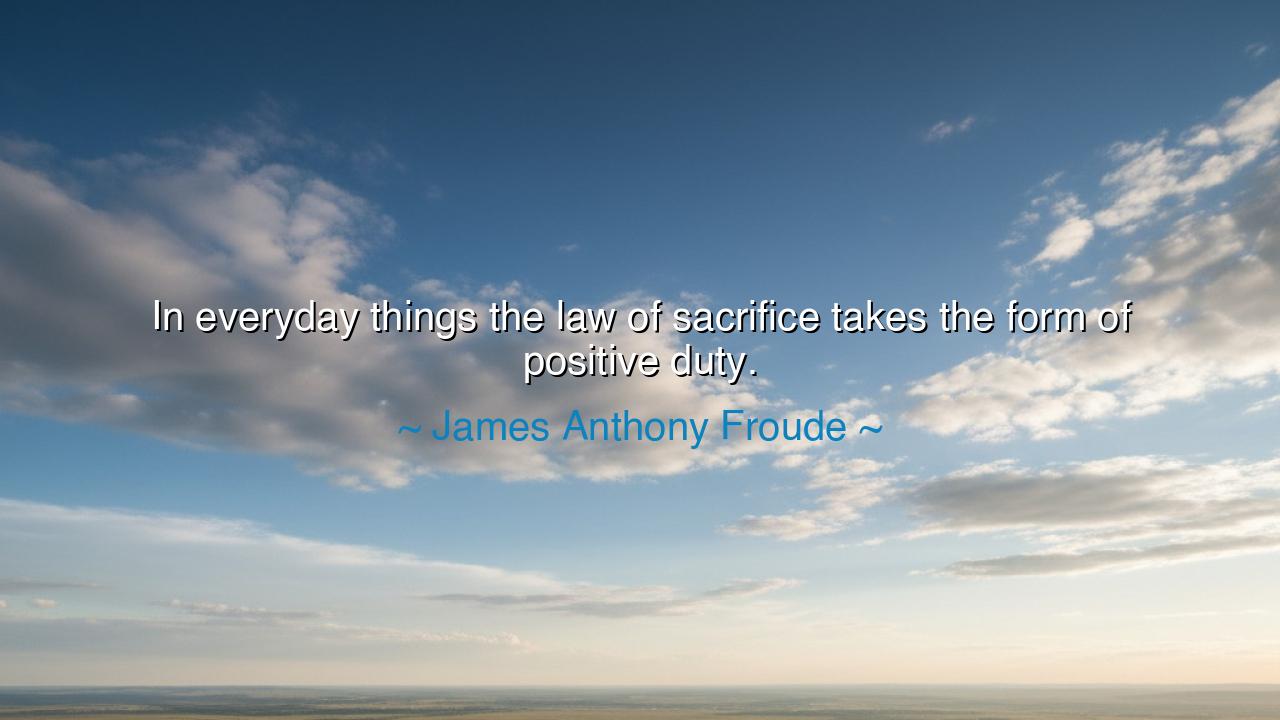
In everyday things the law of sacrifice takes the form of






The words of James Anthony Froude, “In everyday things the law of sacrifice takes the form of positive duty,” echo like the measured tolling of a great bell, reminding us that life’s nobility is not found in grand gestures alone, but in the quiet burdens we willingly bear. What he names as sacrifice is not always the dramatic surrender of wealth, life, or glory; it is the steady offering of the self in the small tasks, the humble services, the unseen acts of love and responsibility that weave the fabric of society.
The origin of this wisdom springs from the timeless truth that all progress, all harmony, all justice requires a yielding of self. The farmer rises before dawn, not for glory but for bread to feed his children. The soldier stands guard in silence, not for applause but to protect unseen lives. The mother lays aside her comfort for the sake of her child. In these daily labors, the ancient law of sacrifice reveals itself in its most enduring form—as positive duty, chosen and embraced.
Consider the story of Florence Nightingale, who in the Crimean War did not charge into battle with sword, yet gave her life to the wounded through countless nights of tireless service. Her sacrifice was not a single dramatic moment, but a lifetime of duty—tending the sick, reforming hospitals, and bringing dignity to those whom society had cast aside. Her legacy teaches that greatness often hides in the daily acceptance of tasks that seem small, yet bear eternal weight.
Froude’s words remind us that it is not enough to admire sacrifice from afar. The true test lies in our own everyday things—in whether we perform our duties with reluctance or with courage, with bitterness or with love. To pay a debt, to speak truth when silence is easier, to care for a neighbor, to labor faithfully in obscurity—these are the altars upon which the soul proves its worth.
The meaning is heroic, though quiet: if all men and women embraced their positive duty as sacred, the world itself would be transformed. Wars would lessen, justice would flourish, and compassion would no longer be rare, for each heart would willingly yield its share of sacrifice for the good of all.
Let the generations remember: greatness is not always forged in fire, but in patience. The law of sacrifice does not always call for death—it calls for life lived with devotion, for hands that do the hard task gladly, for hearts that hold steady in the face of weariness. To embrace duty is to embrace the very path of honor, and in this lies the quiet heroism that sustains the world.






NTnguyen ngoc tram
The notion that sacrifice is a 'positive duty' offers a view of selflessness as something we willingly take on, not as a loss but as an active contribution to the world. It suggests that sacrifice isn't always a tragic or negative thing but can be a fulfilling aspect of human interaction. However, how do we ensure that such sacrifice remains sustainable without individuals feeling depleted or resentful of their duties?
PMPhuong Minh
Froude’s quote makes me reflect on the nature of sacrifice in modern life. So often, we’re expected to sacrifice our time, energy, or desires for the sake of responsibilities, whether at work or at home. While this can certainly be seen as a positive duty, it raises the question: Are we overburdened by these expectations, or are we failing to recognize the value and rewards of sacrifice in building stronger communities?
Vverywonderful
This quote brings up the question of how much of our everyday actions are motivated by a sense of duty rather than self-interest. Sacrificing for the benefit of others is often seen as virtuous, but does it ever get to a point where we lose ourselves in the process? What happens when this 'positive duty' becomes more about fulfilling societal expectations rather than genuine selflessness?
TDBui Thuy Duong
Froude’s perspective on sacrifice is interesting because it ties it to a positive duty. It reminds me of the sacrifices parents make daily for their children, or the small compromises we make in relationships or at work. But when does this sense of duty become overwhelming? How do we balance the need for personal well-being with these everyday sacrifices that seem to be expected of us?
CLChi Lan
This quote reflects the idea that sacrifice isn’t just about giving up something significant, but that it manifests in our daily lives through the responsibility we take on. The concept of sacrifice as a 'positive duty' suggests that it’s not necessarily a burden but an active choice we make for the good of others or for the greater good. How can we change our perspective to see everyday sacrifices as empowering rather than burdensome?